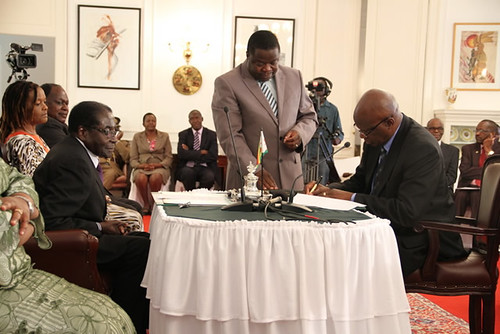
Minister of Finance Patrick Chinamasa being sworn in to a new cabinet post for the Republic of Zimbabwe. The ceremony took place on September 11, 2013., a photo by Pan-African News Wire File Photos on Flickr.
Govt to prioritise economic growth
September 12, 2013 Business
Business Reporter
NEWLY appointed Finance Minister Patrick Chinamasa says Government’s priority would be growing the domestic economy and increasing participation of indigenous people in mainstream economic activities.
Minister Chinamasa said this in an interview immediately after the swearing in of the new 26-member Cabinet by President Mugabe at State House yesterday.
Minister Chinamasa said that the new frontier of Zimbabwe’s struggle was now the economy after the country secured political independence and sovereignty.
“Government’s priority is to grow the economy and increase the participation of our indigenous people in the economy from current levels,” he said.
Minister Chinamasa pointed out that Government efforts to boost economic growth come under a barrage of economic sanctions from Western countries hence the need to scout for new relations with nations of similar psyche.
“Of course, we do so (growing the economy and indigenisation) under a regime of (illegal) sanctions so we need to identify new economic friendships.”
He, however, would not be drawn into commenting on other economic issues his ministry and the Government will need to work on to ensure sustainable economic growth and development.
The new Zanu-PF-led Government has its work all cut out and will need to hit the ground running in light of economic recovery growth running out of steam.
Government has projected economic growth at 4,5 percent this year on slower growth in agriculture and mining. This contrasts sharply with 7,1 percent average economic growth that characterised the period 2009 to 2011.
The single biggest constraint to sustainable and rapid economic growth in Zimbabwe has been the limited availability, access and high cost of long-term funding.
Other issues include rolling power cuts due to the shortage of power, high cost of labour and utilities, shortage of raw materials, old and inefficient equipment, poor infrastructure and competition from low-priced imports.
However, the upside potential for domestic economic growth remains immeasurable due to abundance of world sought mineral resources, excellent climate for agriculture, high literacy rate, skilled and educated workforce.
In addition, Zimbabwe’s potential to grow, besides being one of the few lucrative last frontiers of growth, is limitless as it is coming from a low base after a decade of recession that decimated about half of its gross domestic product.
Speaking shortly after being sworn in, new Mines and Mining Development Minister Walter Chidhakwa said mining contributes significantly to the economic growth of Zimbabwe in a number of ways.
“Mining contributes significantly to the economic growth of Zimbabwe from the point of view of investment generation in mining. Mining is nothing other than promoting investment into the sector. There is need for greater inflows of foreign investment.
“There is need to promote value addition to the greater benefit of the local economy. There also is need to create employment opportunities and increase foreign exchange inflows to feed into the balance of payment support,” the new minister said.
However, Minister Chidhakwa said it was unfortunate that Zimbabwe and Africa at large had suffered the ignominy of foreign ownership that in most cases saw the repatriation of export proceeds for the benefit of foreign countries.
To that end, he said it would be critical to continue to broaden international economic relations and partnerships to attract fresh investment into the mining sector.
Former Mines and Mining Development Minister Dr Obert Mpofu, now in charge of Transport Communications and Infrastructure Development, said Government priority would be attending to issues surrounding transport, roads, airlines, poor infrastructure as well as the people’s aspirations.
No comments:
Post a Comment